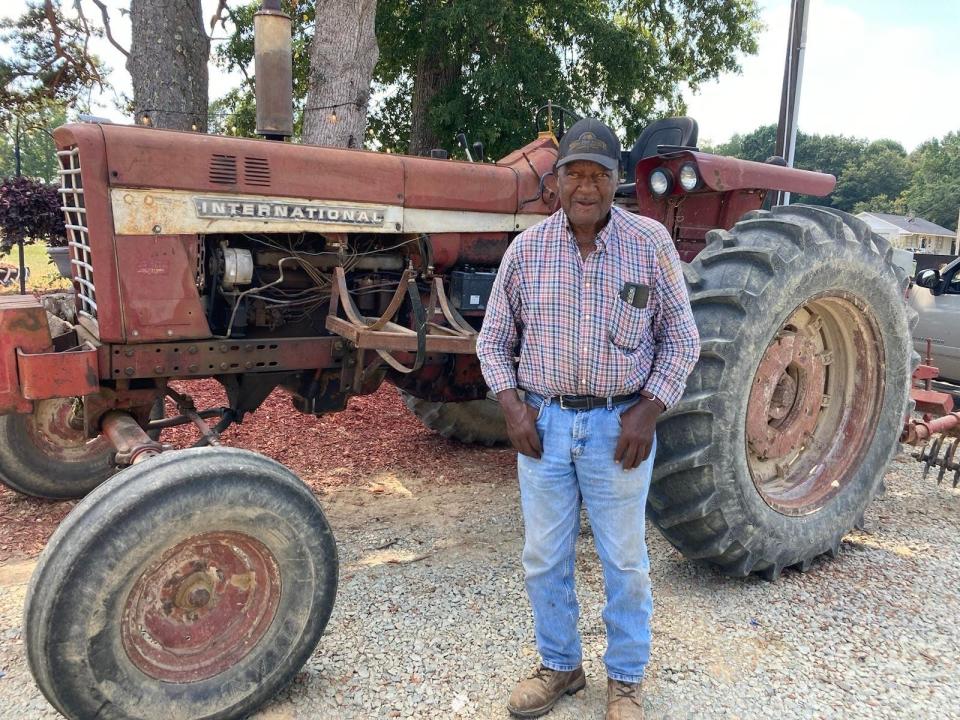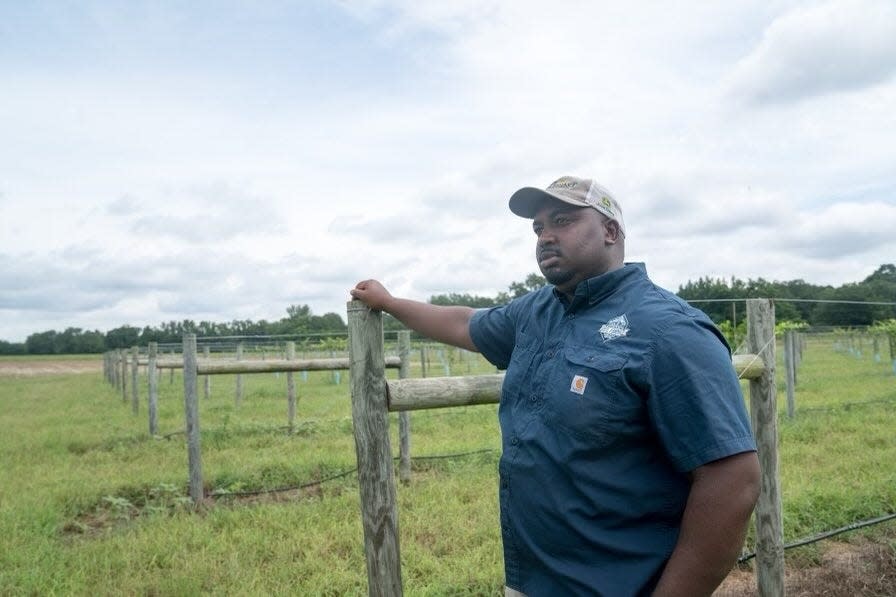'Farming is very isolating': Inside the networks helping Black farmers cope with stress
Some bet the farm on a chance. Since Davon Goodwin opened Off the Land Farms in Laurinburg, North Carolina, four years ago, he’s bet his house on his farm succeeding. “All our money is in the ground,” he said.
Farming is fear and faith. “You put a seed out there, and you hope to have a harvest,” Goodwin said.
Two hours north, Stanley Hughes, 75, knows that strain. He was born on the land he farms. His motto, quoted wife Linda Leach: “If you love playing in the dirt, and you love the soil, and particularly the soil you grew up on, and you want to be broke all your life, then go into farming.”
Farming is a stressful job for anyone. Moreover, farming isn’t just a profession: It’s an identity. Failure in the business can shake people to their foundations.
Black farmers like Goodwin and Hughes carry additional loads that stem from racist discrimination. To name a few factors, there’s loan inequity, being cheated out of land and dealing with legal problems such as heirs’ property: farms passed down with multiple family owners and no clear title, vulnerable to seizure.
Stress can make you physically and mentally sick. Across the South and the nation, Farm and Ranch Stress Assistance Networks are trying to help farmers, white and Black, with both the practical and emotional weight.
Robin Tutor Marcom of the North Carolina Agromedicine Institute started working on farmer stress in 2012, long before federal funding for the formal assistance network came through.
“We’re working so hard to expand our diversity,” said Marcom, who is white. “We really have to make a concerted effort every single day to ask that question: What are we doing to serve Black farmers? What are we doing to serve indigenous farmers? What are we doing to serve farmworkers?”
Black farmers have strengths. They build community, whereas white farmers tend to go it alone, said Marcom and two men working on stress out of North Carolina Agricultural and Technical State University, Mark Blevins and Fletcher Barber. They lean on their churches and create coalitions where they share resources and encouragement. They’re more transparent with each other.
“But don’t let it look like oh, it’s rosy in the community, because it’s not. It’s hard. It’s even harder for minority growers to succeed and thrive,” Blevins said. “There’s a whole lot of overcoming that is part of every Black farmer’s story.”

'Like you've been dealt a losing hand'
During Hughes’ childhood, there were 20 or 30 Black farmers nearby, he said. Now all his neighbors are white. Over more than an hour, prodded, the quiet man listed a litany of stress.
“Tough years with unpredictable weather — you know, no one can predict the weather,” he said. Pine Knot Farms grows organic tobacco and vegetables. “Some of our crops had to be late with a wet spring. And as soon as we plant, the rain is gone.”
Relying on farmworkers who always have a reason not to work. Money. “I’ve got three tractors and all of them need to be in the shop,” he said. Two decades ago, Hughes lost 53 acres of family land. Pine Knot Farms has received shelves of awards and recognitions, but even so it wouldn’t survive without Leach’s tight budgeting and grant applications, she said.
Sometimes you’re “doing all the things to put back together something, and it still falls apart, like you’ve been dealt a losing hand,” he said.
Racism. “Being Black ain’t easy,” Hughes said. “You’ve got the good ol’ boys you have to deal with.… They ain’t going to help you.”
At town farmers markets, white farmers accused him of not growing what he sold. Now he sells only at the Black Farmers Market. Lenders gave him less than they gave white farmers and monitored every cent he spent.
So how has Hughes managed that stress? Endurance. If you can’t fix it, “you just have to take it,” he said.
When he lost the 53 acres, Leach cried for weeks. Hughes didn’t. What would that help? “Folks turn to alcohol,” he said. “Ain’t going to serve anyone.”
“He holds that stress in,” Leach said. “It really went against his health.”
Uneven Ground: Exceptional Black farmers and their fight to flourish in the South
Alone in a field with your worries
Goodwin, 34, also worries about money. There’s the stress of trying to put it all together when resources are limited. Black farmers have historically had less access to capital.
How to find family time when you farm on top of a full-time job. Goodwin is starting to get better at taking breaks. “The weeds are going to be here when I get back,” he said. Not so “the opportunity to spend time with my kids at the beach.”
The pressure of wanting to leave a legacy. The need to communicate openly and honestly with his wife about spending decisions. He’s seen farm marriages fail over that.
All that can rattle around in your head. “Farming is very isolating. Very isolating,” Goodwin said. Spend too much time alone with your thoughts, “that’s just like the devil’s playground.”
Goodwin is a veteran. To get perspective, he remembers Afghanistan: At least he’s not getting blown up.
“I think the hardest part of farming is all in your head,” he said. “Because you don’t control nothing.”
Addressing both practical and emotional factors
That’s what Crystal Cook Marshall has found. She researches farmers at North Carolina A&T, the state’s historically Black land-grant university.
“Anxiety is the number-one issue farmers face,” Marshall said. “What isn’t known is a lot about how the stress and anxiety plays out specifically for Black farmers.”
Marcom and colleagues found last year that both white and Black farmers experienced chronic and sometimes acute stress. White farmers were more likely to be in “acute crisis.”
Marshall is studying the best ways to reach Black farmers about extreme weather and the issues that come with it, including managing personal stress and providing leadership in the community.
Various projects are underway in the network, at A&T and at North Carolina State, the predominantly white land-grant university. They have two prongs.
First, they aim to help farmers with the practicalities. “It takes a multifaceted approach,” Marshall said. “Mental support is only one of them.”
Hughes agreed: “Coaching without financial assistance wouldn’t be much support,” he said.
Second, they target mental health directly. “Stress” is a way of saying “mental health” that gets the N.C. Farm and Ranch Stress Assistance Network in the barn door, Marcom said.
The network runs a 24-hour helpline, trains farmers to recognize signs of suicidal thinking, helps farmers find and pay for counseling, and runs a peer support network called Farmer to Farmer, among other activities.

Not that the counseling part is simple. “We all know that we have a shortage of mental health providers, and providers that understand the culture of farmers, and this is even harder with our Black farmers,” Marcom said. “It is like mining for gold.”
Finding Black farmers to participate in Farmer to Farmer as mentors in the peer counseling program has been challenging, Marcom said. But that’s started to change. A few Black farmers have referred Black friends to the network. That means the organization is building trust, Marcom said. It’s a sign of success.
Goodwin has participated in an assistance network discussion. Farmers are skeptical of therapists, he said — they think they’re book-smart people who will judge them. Peers get it. He draws strength from the neighbors that honk hello when he’s in the field. They’re mostly white farmers, but they want him to succeed.
“When you’re a young Black farmer, you need that community,” he said. “You need someone to come by and check on you.”
He does the same for them. Recently, a 70-year-old white neighbor, a fellow farmer, stopped by and vented for an hour. “I didn’t get all my stuff done — but he probably needed that conversation,” Goodwin said. “He needed a shoulder to cry on.”
Danielle Dreilinger is an American South storytelling reporter and the author of the book “The Secret History of Home Economics.” You can reach her at ddreilinger@gannett.com or 919/236-3141.
This article originally appeared on Nashville Tennessean: Programs offer Black farmers support with stress, mental health

